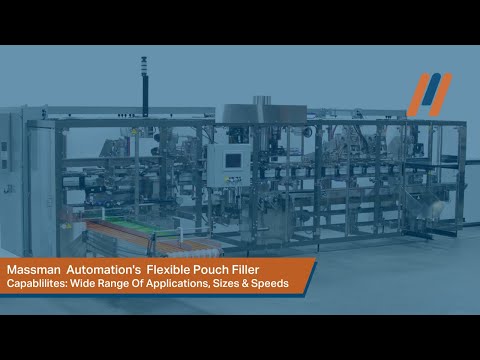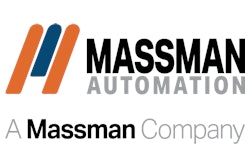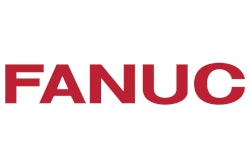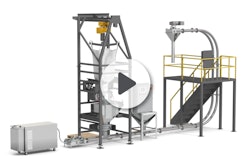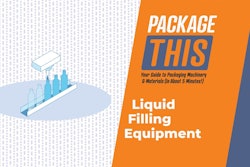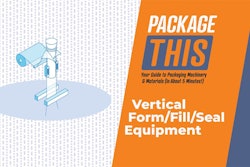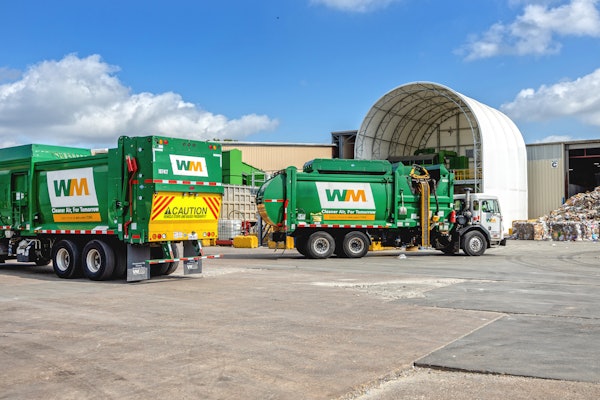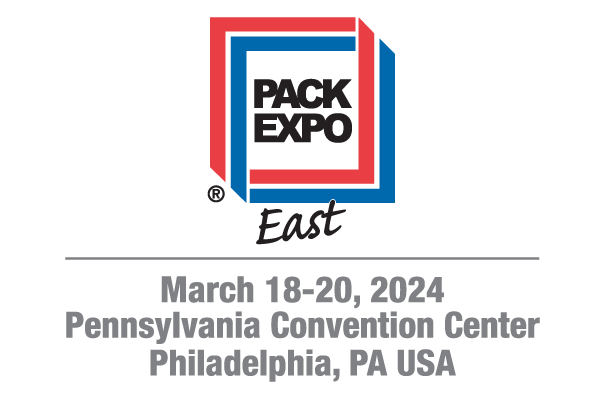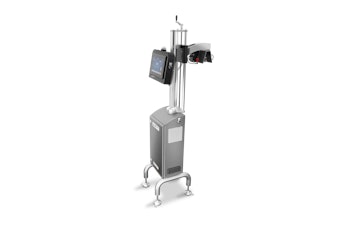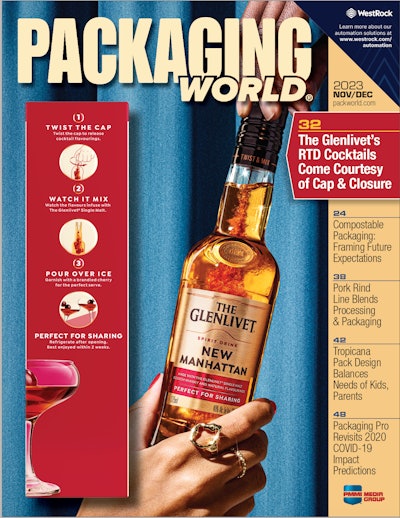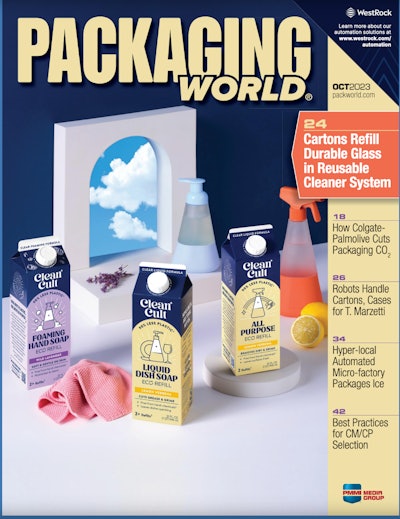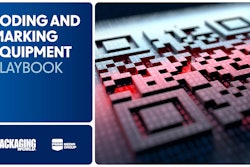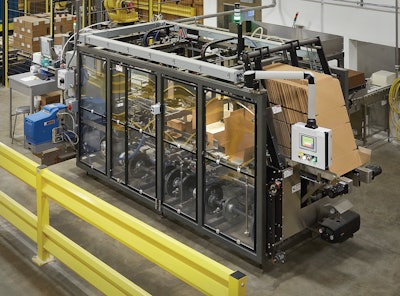
Throughout the cheese industry, companies produce bulk cheese in a wide range of different varieties that we don’t see on the retail shelf. These companies then supply to customers who either use the cheese products in formulating other food products, or reformat the bulk cheese into wedges, slices, shredded cheese, or other configurations for consumer use. One of these companies is Wisconsin Whey Protein, a company best known in the industry for its superior quality whey products, but which, since 2015, has also produced bulk white cheddar cheese, one of the most popular cheeses among both consumers and the companies that incorporate it into finished food products.
Until recently, the company packaged nearly 1.4 million lbs. of bulk cheese on a weekly basis into 500-lb corrugated barrels, a popular option for bulk cheese shipments. In 2019, in recognition of other options to expand its cheese output packaging operation from packaging output only in barrels, it would add a 40-pound block format that was better suited for more cheese varieties and new customers’ needs.
“We decided to also offer our cheeses in 40-pound blocks in addition to the 500-pound barrels to meet those new customer demands,” says Vern Kind, Wisconsin Whey’s master cheesemaker. “Our production levels would remain essentially the same, but customers would now be able to choose in which format they wanted their cheese delivered–barrels or blocks.”
Wisconsin Whey Protein and Stainless Technologies are sister companies with common ownership. A new cheesemaking line was developed and installed by Stainless Technologies, which designs, manufactures, and installs turnkey dairy processing systems, including infant formula lactose, whey protein and cheesemaking systems. The end-of-line portion of the new line, which packages the blocks for shipment, consists of a Massman Automation Cheese Block Wrap Around Case Packer that automatically case packs the blocks of cheese, then feeds the cases directly into a Massman robotic palletizer to prepare them for final shipping. The new cheese processing line feeds plastic-wrapped, vacuum-sealed, 40-lb. blocks of white cheddar, Monterey Jack, or parmesan cheese to the case packer infeed conveyor, which then carries them into the new integrated end-of-line packaging process.
 | Interested in cheese and whey protein production? Check out this recent article: MWC Creates a Cheese and Whey Recipe for Success. Or, you can watch a video of author Joyce Fassl live in the MWC plant. |
Case packaging and palletizing
During the case packing operation, the cheese blocks enter the case packer on a conveyor that moves each against a corrugated liner that then wraps around three sides of the block before it continues into the erected case. This liner protects the block and its protective plastic wrapper from damage as it is moved into the case, preventing the plastic wrap from tearing and exposing the cheese to the air. This feature, which according to the company is unique to Massman’s 40-lb block wraparound case packer, enables the system to continuously pack as many as 25 blocks per minute. The automated system pushes cheese blocks into wraparound corrugated cases, which are then sealed and palletized.
The automated system pushes cheese blocks into wraparound corrugated cases, which are then sealed and palletized.The case packer wraps the erected case around the block, then closes and seals the flaps. A key feature of the Massman case packer is the ability to square the case from all four sides, including the top, to ensure a perfectly square case. After sealing, the case conveys to a labeling area where informational labels are applied that identify the production batch, the date produced, an ingredient list, and any customer-required information.
Next, the blocks move on to a Massman Robotic Palletizer. The blocks are fed and accumulated on a zoned conveyor that minimizes surge. A Fanuc robot moves the blocks via a vacuum end-of-arm-tool (EOAT) to the waiting pallet, building full pallet loads of 54 blocks. Since the cheese blocks are still warm at this point, the pallet loads are built in an open “chimney” format to allow the cheese to cool evenly. When filled, pallets are moved from the palletizer by a forklift to a storage facility where the cheese undergoes sampling for quality analysis before shipping to customers. Once a pallet load leaves the palletizer, a pallet dispenser automatically conveys an empty pallet into position to receive the next load of blocks.
Installation and integration
The Stainless Technologies team has deep expertise in installing turnkey dairy operations, including integrating cheese production lines with packaging operations. It installed the cheesemaking portion of the new line, after which Massman Automation installed the packaging elements and integrated the two parts of the production line in collaboration with Stainless Technologies technicians. The installation included programming the entire integrated end-of-line operation, including controls for the Fanuc robot as it built pallet configurations.
As in the case of most machinery installations, the case packer and the palletizer themselves were not modified, but the arrangement of the equipment within the Wisconsin Whey space was, including adjusting the length of conveyors between the elements, and the controls to integrate their movement.  A Fanuc robot palletizes packaged blocks, still warm from processing, in a “chimney” format to facilitate cooling.
A Fanuc robot palletizes packaged blocks, still warm from processing, in a “chimney” format to facilitate cooling.
“The installation was seamless, and the trial runs were successful right away,” says Kind. “We collaborated with Massman’s team both before and during the installation to coordinate the cheesemaking and packaging parts of the line.”
A minor glitch occurred at the very end of the line. The empty pallets being automatically conveyed into place for the next pallet load tended to hang up on the system’s slides. Adding silicone strips to the slides soon overcame that. The only other challenge was a maintenance issue: handling so much corrugated material produces a light dust around the case packaging area, which can coat the lenses of the various photo eyes that control parts of the operation. Regular cleaning as part of the daily operation has eliminated that problem.
Results
In the days before Wisconsin Whey added the block configuration line, processing a vat of cheese would produce about 12 barrels of cheese, each weighing about 500 pounds of finished cheese. The new line by contrast, produces about 150 blocks of cheese, each containing about 40 lbs. of finished cheese, from a same sized vat.  The fully automated Wisconsin Whey end-of-line system was configured to fit the cheese maker’s available space.
The fully automated Wisconsin Whey end-of-line system was configured to fit the cheese maker’s available space.
This not only enables Wisconsin Whey to meet the needs of those customers requiring product in 40-lb. blocks, but it also enables the plant to make other American and Hard Italian cheese varieties not normally packaged in the barrel format, therefore expanding its customer base.
Currently, Wisconsin Whey is operating the new line for a full shift several days a week. As it continues to develop the growing market for the 40-lb. blocks, it expects to extend that to an everyday operation.

